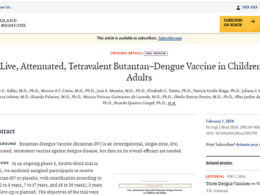the health
transformation
knowledge portal
Joaquim Cardoso MSc
Founder and Chief Researcher, Editor & Strategist
March 28, 2024
What is the message?
Recent measles outbreaks in the United Kingdom and the United States underscore the critical importance of vaccination in safeguarding public health.
These outbreaks serve as a stark reminder of the risks posed by vaccine-preventable diseases and the need for vigilant immunization efforts.

This summary is based on the article “Measles outbreaks a wake-up call for the unvaccinated” published by The Hill and written by Joseph Choi on January 27, 2024.
What are the key points?
Measles, a highly contagious viral infection, has resurfaced in the UK and several US states, prompting urgent warnings from health authorities.
Despite being declared eliminated in the US in 2000, measles outbreaks continue to occur, largely among unvaccinated individuals.
The measles vaccine is nearly 100 percent effective in preventing infection, highlighting the significance of vaccination in disease prevention.
Both the US and UK have experienced declines in measles vaccination rates, falling short of the recommended 95 percent coverage needed to prevent outbreaks.
Experts attribute the resurgence of measles to factors such as vaccine hesitancy, disinformation, and disruptions in healthcare services during the COVID-19 pandemic.
Complications from measles can range from otitis media to pneumonia, highlighting the importance of timely identification and isolation of cases to prevent further transmission.
What are the key statistics?
More than 300 probable measles cases have been detected in the UK since October, with the majority centered around Birmingham.
The US has reported at least 23 measles cases since December, with seven imported by international travelers.
Measles vaccination rates in the US and UK have declined in recent years, reaching 93 percent and 92.5 percent, respectively, among kindergartners.
Globally, over 61 million measles vaccine doses were postponed or missed from 2020 to 2022, increasing the risk of outbreaks.
What are the key examples?
The UK Health Security Agency has urged immediate action to boost measles-mumps-rubella (MMR) vaccine uptake in communities with low vaccination rates.
Vaccine hesitancy and complacency, exacerbated by the COVID-19 pandemic, have contributed to waning immunization rates and increased susceptibility to measles outbreaks.
Despite concerns about potential spread, travel restrictions between the US and UK are deemed ineffective, with the virus contained within specific regions.
Conclusion
Measles outbreaks serve as a sobering reminder of the importance of vaccination in preventing the resurgence of vaccine-preventable diseases.
To combat measles effectively, sustained efforts to improve vaccination rates, combat vaccine hesitancy, and ensure access to healthcare services are essential.
By prioritizing vaccination and public health measures, communities can work together to mitigate the risk of measles outbreaks and protect vulnerable populations.
To read the original publication, click here.











